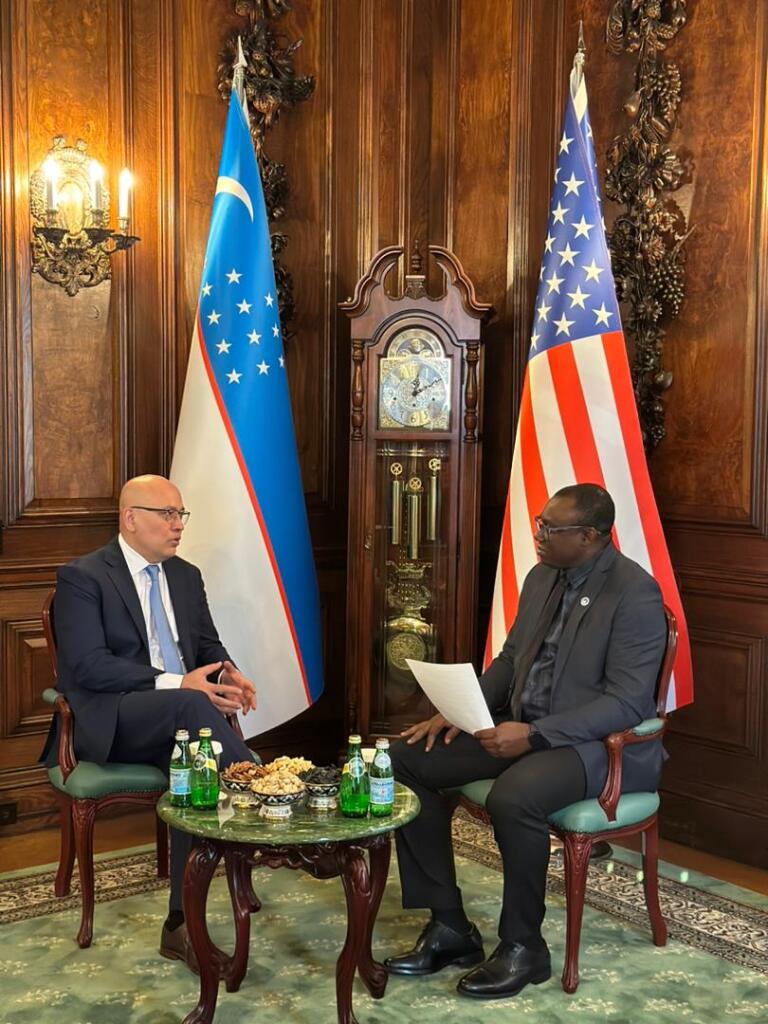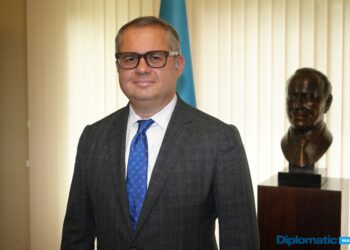Diplomatic Watch Magazine had the opportunity of conducting an in-depth interview with His Excellency, Furqat Sidikov, Uzbek Ambassador to the United States, at the Embassy of Uzbekistan. The conversation explored the multifaceted and evolving economic, political, and cultural relations between Uzbekistan and the United States. Ambassador Sidikov detailed the current dynamics of trade and investment, identified the promising sectors for collaboration, and outlined Uzbekistan’s ambitious reforms under President Mirziyoyev’s leadership. This dialogue also covered the burgeoning cultural exchange and tourism initiatives, the country’s strategic goals for regional stability, and its progressive steps in human rights and governance. The Ambassador’s passion and commitment to building a strong Uzbek-American partnership came through clearly in the discussion, giving a thorough outlook on Uzbekistan’s future course.
As Ambassador of Uzbekistan, how would you describe the current economic and trade relations between Uzbekistan and the United States of America? Which sectors show the most promise for increased collaboration?
Thank you so much, first of all. I would like to thank you for coming. Of course, it is a great honor to have you here today. I appreciate your time and friendship. Welcome to the Uzbek Embassy. Yes, thanks so much because that is a very good question. As you know, we are now enjoying a strategic partnership with the United States. We have a very deep, comprehensive, open, and trusted dialogue with the United States in all areas: political, security, human dimension, and support of the United States’ for the ongoing large-scale reforms under the leadership of the President of Uzbekistan. As you know, Uzbekistan has become an engine of reforms, and these reforms are unique.
On the initiative of President Mirziyoyev, we’ve undertaken many reforms to liberalize the economy. Uzbekistan has become more open to the world market. We have liberalized our economy, implemented significant economic and democratic reforms, and made successful strides in human rights and other issues. The human dimension has become the basis of a new relationship between the United States and Uzbekistan, attracting more American businesses to Uzbekistan. Now, we are focusing on enhancing trade and investment cooperation with the United States.
Comparing last year or 2022, our trade volume increased by more than 16%. Uzbek exports to the American market increased by more than 300%. Notably, 60% of Uzbek exports to the American market are in the IT sector. Uzbekistan is becoming an IT hub for several American companies.
Many American companies are sourcing IT services from Uzbekistan. This is a good dynamic, but it does not fully reflect our existing economic potential.
Many famous and important American companies are operating in Uzbekistan. For instance, we have a General Motors factory, which is the biggest General Motors asset outside of the United States, producing American cars: Chevrolets, Jeeps, and Sedans. These cars are very popular in the region, and we are exporting them from Uzbekistan. Additionally, we have John Deere, Caterpillar, and Boeing operating in Uzbekistan.
American financial institutions are also entering Uzbekistan. We have strong cooperation with Oppenheimer, and I recently had productive meetings with Visa, JP Morgan, and Morgan Stanley, all of whom are interested in working in the Uzbek market. This is a positive dynamic of our cooperation, and our most recent success in Uzbek-American relations has been in the field of investment. Last year, during President Mirziyoyev’s visit to New York, we signed an agreement with a major American energy company to invest over ten billion dollars in Uzbekistan’s energy sector. Uzbekistan is becoming an attractive destination for American businesses, offering noteworthy opportunities to enhance our trade and investment cooperation.

Could you elaborate on Uzbekistan’s 2030 strategy?
We have a strategy called Uzbekistan 2030. Under the initiative of the President, the new Uzbekistan is moving towards a green and digital economy. This is why Uzbekistan is becoming an IT hub of the region, especially for American businesses.
However, there is still a lot of untapped potential. Recently, I visited different states in the United States, including Minnesota, California, and Mississippi. There is a lot of potential for collaboration between Uzbekistan and the United States. For example, agriculture is a promising area. Uzbekistan is an agricultural country, and I had several meetings with American companies specializing in water-saving technology, which we would love to bring to Uzbekistan.
What initiatives are promoting cultural exchange and tourism between the United States and Uzbekistan?
Thank you so much. That is an area with a lot of potential. According to the State Department, Uzbekistan is listed as a Level 1 country for American citizens to travel to. The good news is that we have direct flights from New York to Tashkent. America is among the top ten countries whose citizens visit Uzbekistan. Right now, we have four direct flights per week.

We have unique historical cities, which are the pearls of Central Asia, and many Americans would love to visit. American citizens under 16 years old and over 55 do not need a visa. We are implementing an online visa (e-visa) system for American citizens, and any American can obtain an Uzbek visa within three to four business days. We rarely deny visas, and I cannot recall any issues with visa denials for American citizens. We are working with the United States Government and the State Department to simplify the visa regime, promoting tourism.
We have organized various cultural programs, such as ceramic exhibitions and fashion shows, which were very successful. These cultural programs are important for promoting public diplomacy and enhancing the understanding between our two great nations.

What should tourists expect when visiting Uzbekistan?
If you go to Uzbekistan, you have to expect the unexpected. Uzbekistan is full of surprises. We offer four seasons of tourism and a variety of innovative experiences. You have already witnessed Uzbek culture and tasted Uzbek cuisine. Uzbek cuisine is among the best in the world, and Uzbek Plov is particularly renowned. We promote four-season tourism and historical tourism. We now also offer business tourism for American companies to visit Uzbekistan. Cultural tourism is very important as well. Uzbekistan used to be the cultural center of the Islamic world.
How have political and diplomatic relations evolved recently?
As I mentioned earlier, the large-scale reforms initiated by the President, including the liberalization of the economy and the empowerment of human rights, are becoming the basis of our new relationship with the United States. Uzbekistan has adopted a constructive open-door regional policy promoting the integration of Central Asia. This makes Central Asia a unified region, and American experts now talk about the voice of Central Asia. This opens up new opportunities.
Uzbekistan and the United States are enjoying a comprehensive, open, and constructive dialogue. The United States government fully supports the reforms in Uzbekistan, providing various forms of support such as training programs. Last year, we exchanged more than 60 visits. In September, the President of Uzbekistan attended a meeting in New York, and for the first time, we had an Uzbek Day at the US Congress. On July 10, we will have the next event at Capitol Hill, and I would like to extend the invitation to you. We are expecting a visit from the United States Trade Representative to Uzbekistan in June, which will provide new impetus to our trade and investment cooperation.

What are your main diplomatic goals as Ambassador?
My main goal is to enhance our strategic partnership through trade and investment. One of the biggest goals is to attract more American businesses and technologies to Uzbekistan. A particularly promising area of cooperation is education. We have a unique partnership with Western universities in Tashkent, and we are working with other universities to establish further collaborations. Many Uzbeks are studying in the United States, and education is a crucial part of our strategy. We aim to develop a young, energetic, and educated generation.
What is Uzbekistan’s role in promoting regional stability in Central Asia?
Regarding the reforms, I would like to highlight that these initiatives, led by the President of Uzbekistan, include human rights reforms and other unique success stories. These reforms are for the benefit of Uzbekistan and its citizens. Uzbekistan’s population exceeds 37 million, with more than 60 percent under 30 years old. The country has adopted an open-door policy and works closely with Central Asian partners to ensure sustainable regional security. Regular meetings among Central Asian leaders have been initiated, starting with the first meeting in Astana. We now have a comprehensive, trusting dialogue with all our neighbors, which improves regional security.

What steps is Uzbekistan taking to improve human rights and governance?
As it concerns human rights, we have excellent cooperation with the United States, involving various branches such as the State Department and the relevant commissions. This cooperation has led to success stories, such as the lifting of sanctions against Uzbek cotton. Now, we export textiles to the United States. Last year, the US Labor Department issued a report indicating Uzbekistan’s successful efforts in preventing human trafficking. This success was possible due to the strong cooperation with the United States Government.

What are Uzbekistan’s energy production and sustainability priorities?
Uzbekistan is among the top 10 countries in gas production. We produce and export electricity to neighboring countries, especially Afghanistan. We have a strategy to transition to green energy, with significant investments from Saudi Arabia, Qatar, and other countries. By 2030, Uzbekistan aims to be a leading country in green energy production in the region.
Your Excellency, can you share your journey to becoming Uzbekistan’s Ambassador to the United States?
First off, it’s a great honor and privilege. At the same time, it is a significant responsibility to represent the Republic of Uzbekistan in the United States and advance our strategic partnership. I started my diplomatic career here in 2002 and have spent more than ten years in various roles. This is my third mission. I began at a lower level as an Attaché. I believe that to be a diplomat, you must be a patriot. If you do not love your country, you cannot be a diplomat. I love my country. I have dedicated my life to serving my country. That is my story.

What advice can you give to young readers aspiring to become diplomats?
I don’t like giving advice, but I can share my opinion. Being a diplomat is a great job but also a great responsibility. You promote relationships between countries and nations. You have to be a patriot of your country, love people, and enjoy engaging with different cultures and traditions. Diplomacy is one of the best professions in the world.









